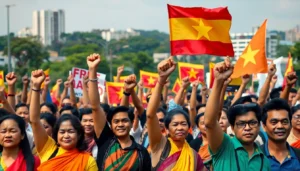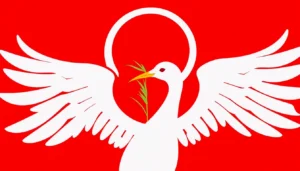Table of Contents
ToggleNavigating the complex world of international relations can feel like trying to assemble IKEA furniture without the instructions—confusing and a bit overwhelming. But fear not! Pursuing an MA in International Relations not only equips students with the tools to understand global dynamics but also transforms them into savvy diplomats, analysts, and policy makers.
Overview of MA International Relations
Pursuing a Master’s degree in International Relations offers a comprehensive understanding of the complexities within global politics. Students explore critical theories and practical applications surrounding diplomacy, security, and international economic relations. Analysis of case studies enhances students’ abilities to evaluate real-world situations, connecting classroom concepts with global events.
Degree programs typically cover various subjects. Core topics include international law, human rights, conflict resolution, and global governance. Electives may encompass areas such as environmental policy, global health, and international trade, allowing students to tailor their education to specific interests and career goals.
Participating in discussions and simulations provides hands-on experience. Role-playing exercises simulate real diplomatic negotiations and conflict scenarios. This active learning approach primes students for future roles in governmental and non-governmental organizations.
Research opportunities abound within these programs. Many institutions encourage thesis projects focusing on relevant international issues, fostering critical thinking and analytical skills. Graduates often emerge with a strong command of the tools necessary for addressing contemporary challenges in global affairs.
Networking plays a vital role in the experience. Programs often facilitate connections with professionals in international relations, including access to internships and job placements. Establishing these relationships can significantly enhance career prospects in fields such as diplomacy, international law, and security studies.
A Master’s in International Relations equips students with essential skills to navigate the complexities of the global landscape while preparing them for impactful careers.
Core Curriculum in MA International Relations

The MA in International Relations encompasses a curriculum designed to provide in-depth knowledge and practical skills. Core courses enable students to navigate complex global issues effectively.
Key Courses and Subjects
Core subjects cover essential topics like international law, human rights, conflict resolution, and global governance. Electives allow for deeper exploration in areas such as environmental policy, international trade, and security studies. Students also analyze contemporary case studies, enhancing their understanding of real-world applications. Discussions and simulations foster critical thinking and collaboration among peers, enriching the learning experience.
Skills Developed Through the Program
Graduates develop analytical and research skills that prove invaluable in various professional settings. Participants enhance their abilities in diplomatic negotiation and policy analysis. Skills in critical thinking and effective communication are prioritized, preparing students for diverse roles. Graduates gain insights into global political dynamics and improve their strategic decision-making capabilities. Opportunities for networking with professionals allow students to build connections within the field, further amplifying their career prospects.
Benefits of Pursuing an MA in International Relations
Pursuing an MA in International Relations offers numerous advantages for students. The program enhances critical skills essential for understanding complex global dynamics.
Career Opportunities
Career opportunities abound for graduates with an MA in International Relations. Diplomacy, analysis, and policy-making are just a few pathways available. Graduates often find roles in government agencies, non-governmental organizations, and international corporations. Research positions in think tanks also attract many individuals with this background. According to the Bureau of Labor Statistics, employment for political scientists is projected to grow 6% from 2021 to 2031, signaling strong demand. The diverse skill set acquired during the program prepares graduates for various positions, enabling them to impact global issues.
Networking and Professional Growth
Networking and professional growth play crucial roles in an MA program. Students often engage with professionals in international relations through events, workshops, and seminars. Opportunities to connect with alumni and industry leaders enhance understanding of career paths. Mentorship from experienced individuals in the field fosters personal and professional development. Building connections leads to internships and job opportunities, increasing employability in competitive sectors. Many programs facilitate networking through partnerships with organizations in diplomacy and global affairs, providing students with essential industry insights.
Challenges of MA International Relations Programs
Programs in International Relations face several challenges that students must navigate. Understanding the complexities of global politics requires significant effort and resilience.
Academic Rigor
Academic rigor in an MA International Relations program demands strong critical thinking skills. Students encounter various theoretical frameworks while analyzing political phenomena. This intensive curriculum often includes rigorous coursework and extensive research projects. Active participation in discussions further reinforces understanding of global dynamics. Students frequently feel overwhelmed by the volume of reading and the depth of analysis required. Balancing theories with practical applications enhances their analytical capabilities. Thus, commitment to academic excellence is essential for success in these programs.
Balancing Studies and Professional Commitments
Balancing studies and professional commitments proves challenging for many MA International Relations students. Many pursue part-time or full-time work while managing their academic responsibilities. Juggling lectures, assignments, and job duties can lead to stress and fatigue. Establishing a practical schedule helps students allocate time effectively. Regular communication with professors and peers also supports academic achievement. Networking opportunities often arise during this juggling act. Students who successfully manage both realms enhance their employability within international affairs. Prioritizing responsibilities plays a crucial role in navigating this demanding landscape.
Pursuing an MA in International Relations opens doors to a dynamic and fulfilling career. Graduates emerge equipped with a deep understanding of global issues and the analytical skills necessary to tackle them. They’re prepared to navigate the complexities of diplomacy and policy-making while making meaningful contributions in various sectors.
The program not only emphasizes academic rigor but also fosters essential networking opportunities that enhance employability. With a growing demand for political scientists, the future looks bright for those who commit to this challenging yet rewarding field. Students who embrace the journey will find themselves well-positioned to influence the course of international affairs.




